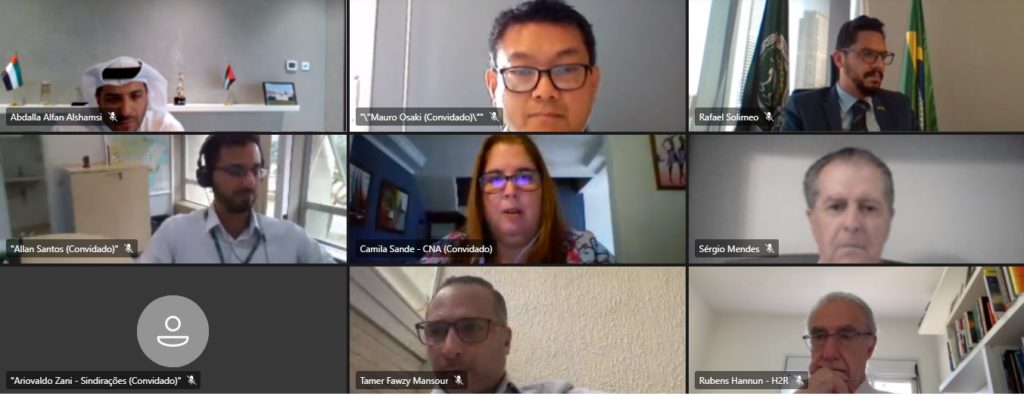São Paulo – The Arab Brazilian Chamber of Commerce (ABCC) and the Ministry of Economy of the United Arab Emirates hosted this Thursday morning (18) an online meeting of public entities and private sector players in Brazil and the UAE to discuss the animal feed market conjuncture. The hike in prices of commodities such as soya and maize has driven up feed costs, and the UAE are having trouble buying from Brazil.
Emirates National Food CEO Janete Al-Haidar said since maize and soya prices went up, in January, there was a sharp increase in the price of feed for her poultry. “We own the biggest poultry farm in the UAE. The hike in prices was devastating to us. There are subsidies available in other emirates, but that is not the case here in Dubai,” she said . Al-Haidar said current prices are not sustainable in the long run.
The soya and maize hike triggered a crisis in commodity imports to the UAE, since costs have gone up 50% to 60% in the last two months, forcing businesses to raise animal feed prices. Emirati business owners attending the meeting inquired whether prices might go down, but the situation is critical.
The Availability Management superintendent at Brazil’s National Supply Company (Conab), Allan Silveira, gave an overview of soya markets around the world and said Brazil is the leading producer and exporter of the grain, with the United States coming in second. According to Silveira, output hit an all-time high in Brazil during the pandemic, but stockpiles have decreased due to strong demand. Nevertheless, Silveira argued that this year should see a “somewhat less tight” scenario than 2020. He said the Middle East takes in 2% to 3% of exports from Brazil, the biggest markets being Iran, Saudi Arabia and Israel. “We already ship to the UAE, though volumes are small. I wouldn’t bet on a significant drop in prices,” he said. Conab is a state-run company affiliated with the Brazilian Ministry of Agriculture, Livestock and Supply.
Mauro Osaki, an agronomist at the Center for Advanced Studies on Applied Economics (Cepea) at the Luiz de Queiroz College of Agriculture (Esalq) of the University of São Paulo (USP), went over agricultural production in Brazil. He said Brazil is the fifth biggest country int eh world, and the third biggest agricultural exporter. He also said there are different biomes in Brazil, and that 66% of its native vegetation is intact. Farming takes up only 9% of land in Brazil, with maize accounting for over half of that.
“Soya price hikes directly impact domestic consumption of various products, such as soya oil, milk, margarine, poultry, eggs, cleaning material, and beef,” said Osaki. The same holds true of maize. “If prices of these commodities go up as a result of demand shock on the international market, that ultimately affects prices to end buyers, especially low-income ones,” he said.
Brazil’s National Confederation of Agriculture (CNA) coordinator Camila Sande said the organization is available to help businesses export and deal with the international market.
UAE Ministry of Economy, Foreign Trade and Industry undersecretary Abdulla Al Saleh moderated the online meeting. He said it is important to ensure that countries are working to get middlemen out of the picture. “If we manage to encourage both sides to communicate directly, we can improve our cooperation possibilities,” he said.
The meeting was attended by ABCC president Rubens Hannun and secretary-general Tamer Mansour, and by the head of the ABCC’s international office in Dubai, Rafael Solimeo. They said the organization is ready to help with Brazil-UAE trade issues.
Attending as listeners were, on Brazil’s side, Brazilian Animal Protein Association (ABPA) chairman Ricardo Santin; Brazilian Beef Exporters Association (Abiec) chairman Antonio Camardelli; National Cereal Exporters Association (Anec) chairman Marcos Gomes de Amorim and CEO Sérgio Mendes; and National Animal Nutrition Industry Union (Sindirações) vice president Ariovaldo Zani.
In attendance from the UAE were the Ministry of Economy’s Competition and Consumer Protection Department director Marwan Al-Sabusi; Emirates National Food board chairman Abdulla Sultan Al-Ouis; Food Security Office head Essa Hashimi; Al Rawabi Dairy CEO Ahmed El Tigani; Marmum Retail Sales head Ajith Shekaran, CEO Jeremiah Henchy, and Sales director Alan Thorpe; and Al Ain Dairy CEO David Kirwan.
Translated by Gabriel Pomerancblum




